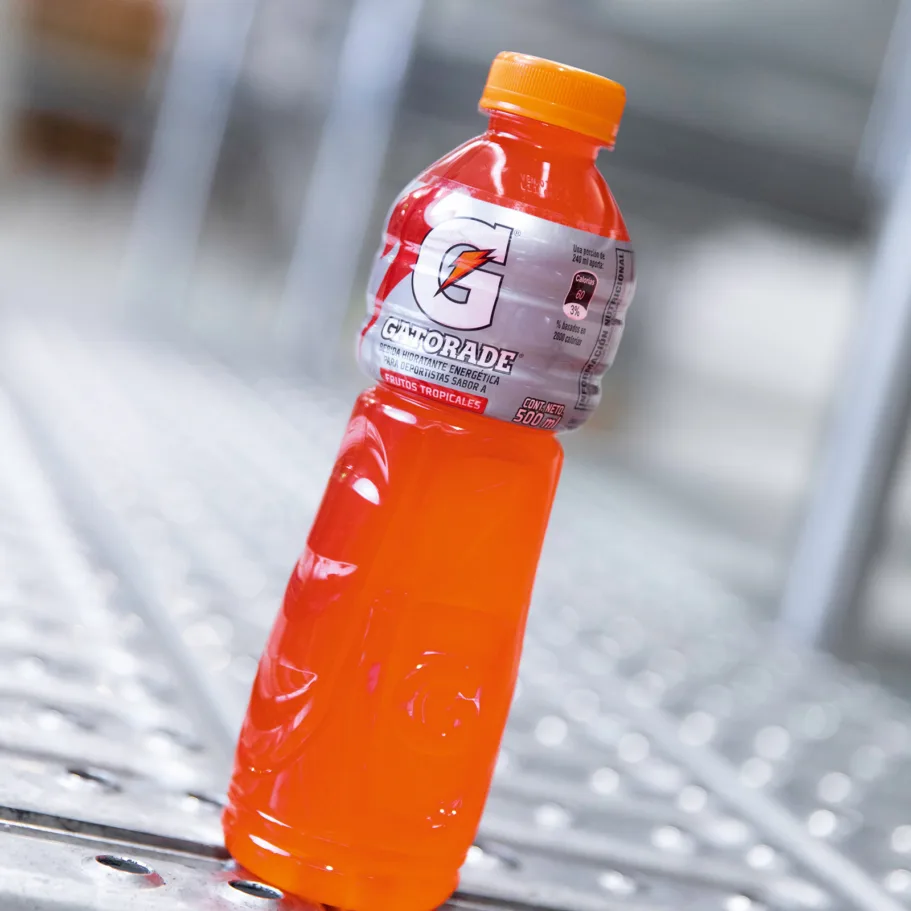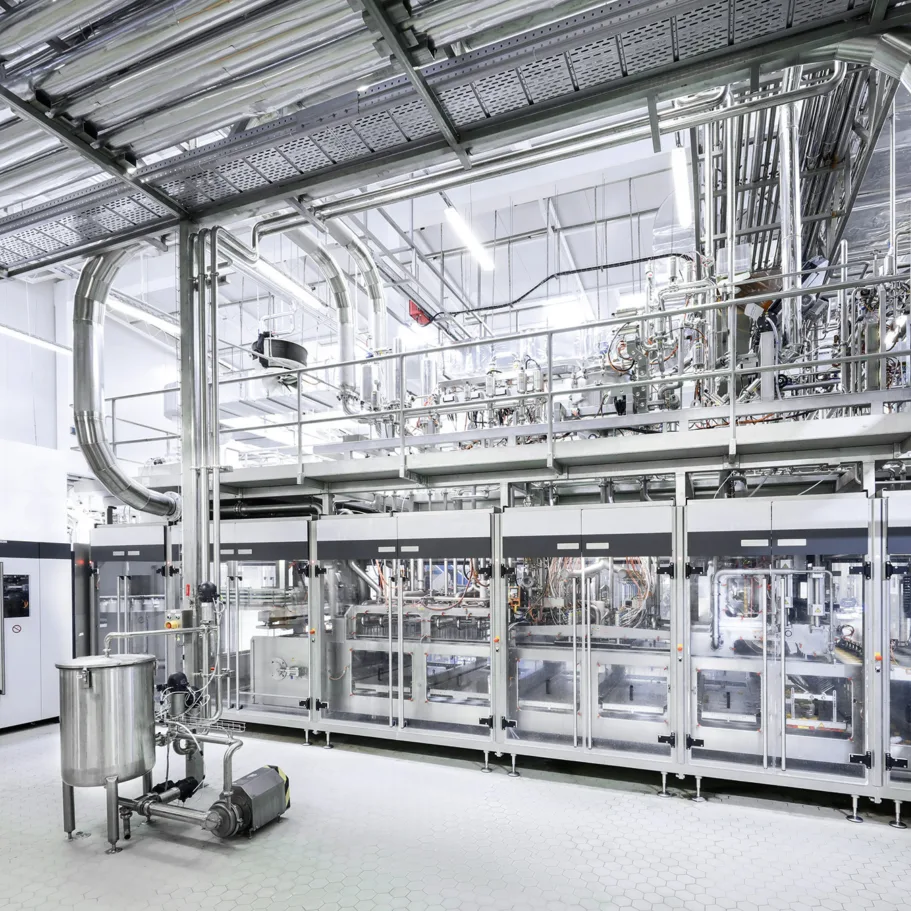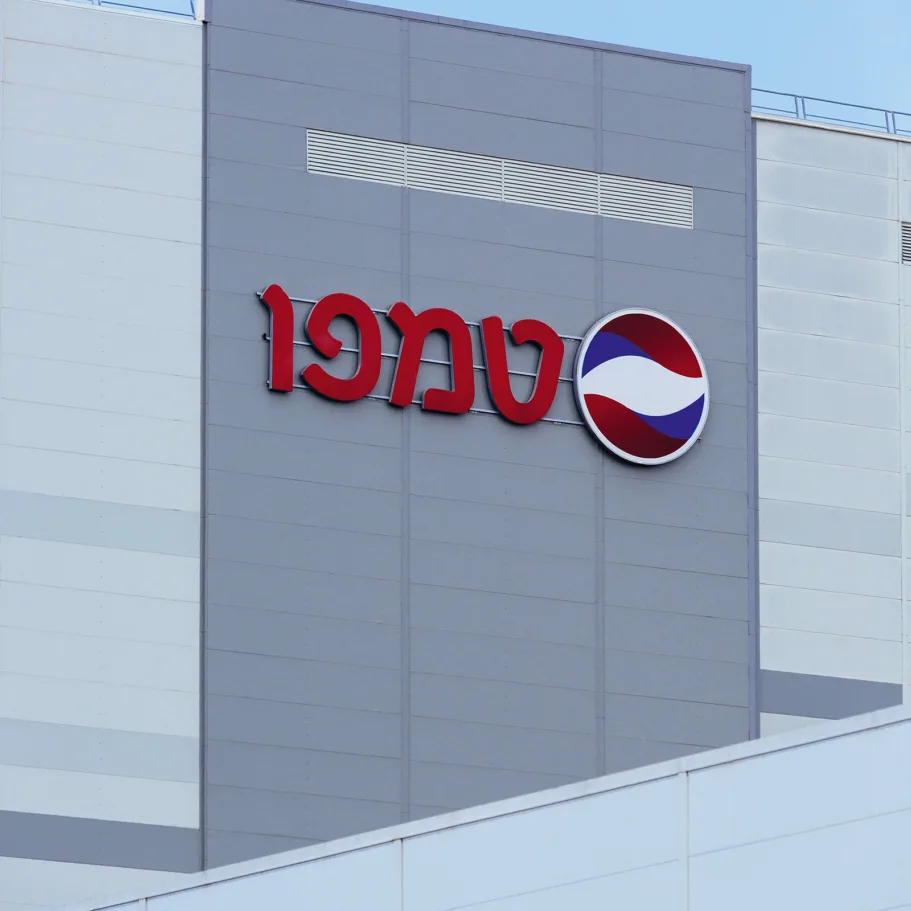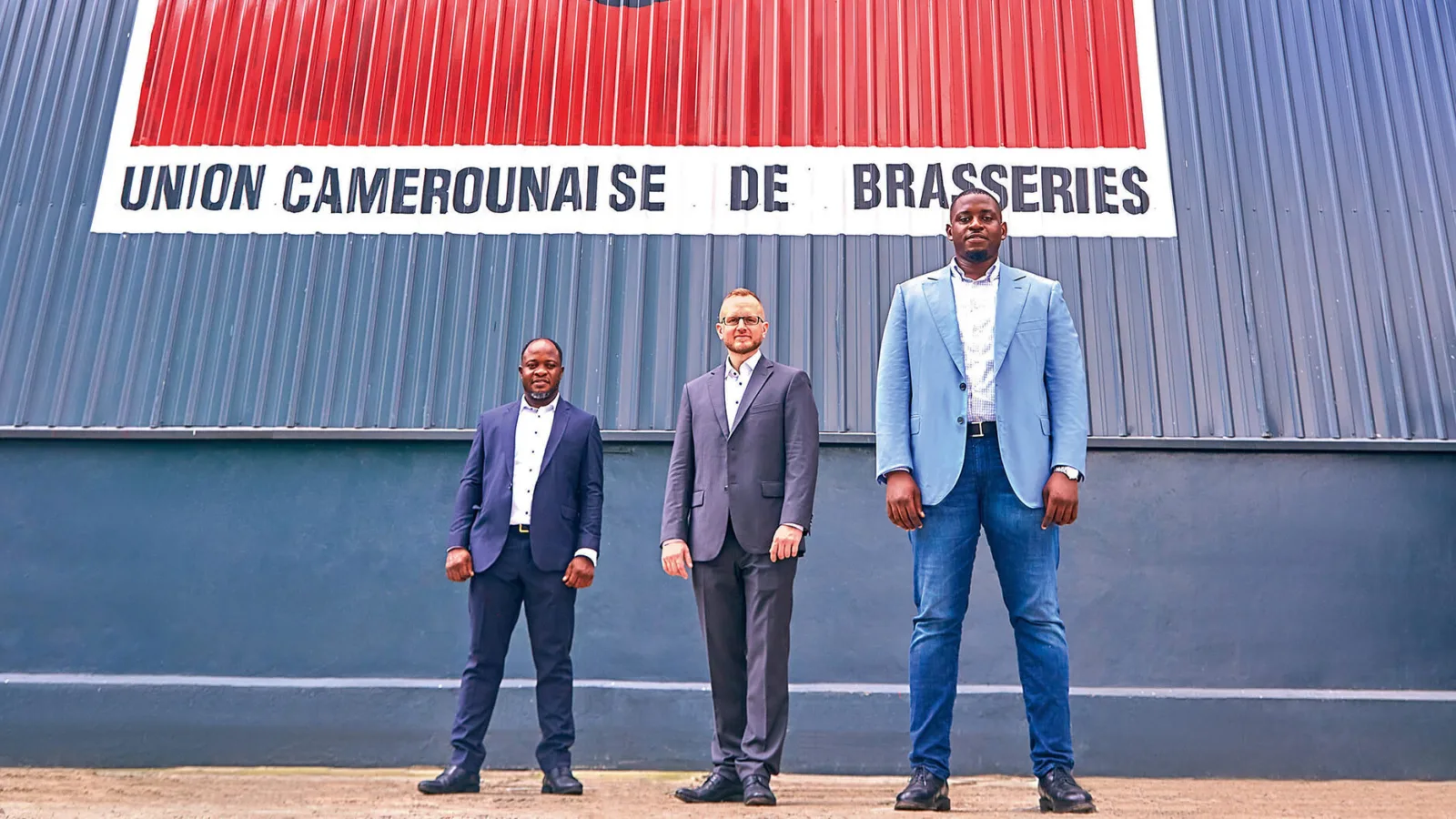
Quality first
On the booming beer market in Cameroon one local brewery isn’t simply out to make a few fast bucks – or francs* – but is instead going for sustainability, high-quality products and future-proof technology. This strategy is proving extremely successful and has made the company the market leader in major cities.
Fast urbanization and a rapidly growing middle class are turning large swathes of the African continent into a dynamic market that holds great potential. With their sales markets in North America and Europe stagnating or declining, this is something international breweries especially are profiting from and where they see new opportunities. Consumption is rising every year by 5%; in 2015 experts from the Deutsche Bank already forecast that by 2025 more than a third of the growth in worldwide beer sales would be attributable to sub-Saharan Africa.
This trend is also evident in Cameroon, whose gross domestic product has more than doubled over the last 15 years. However, it’s not just the big international names that are quenching the increasing thirst of the population here. One local business is also in the same top league as the major players: Union Camerounaise de Brasseries (UCB) based in the port of Douala ranks second on the Central African market between two big global breweries. With its traditional King Beer and Kadji Beer and K44 brands UCB is very popular in Cameroon. The company is also heralded as something of a pioneer. A considerable amount has been invested in new technology since 2016: this includes two new returnable glass lines, for example, for which KHS supplied the entire packaging and palletizing sections in 2019 and 2020. Furthermore, in May of 2021 a KHS PET line – UCB’s very first– was commissioned for the relatively new segment of soda pop and water. It has a capacity of up to 20,000 bottles per hour and comprises a stretch blow molder/filler block, labeler, packaging machine and palletizing equipment. At the time of writing UCB is also considering filling its beverages into cans; in keeping with its role as a trailblazer, this would make it the first brewery in Cameroon to operate its own can filling process.
* Franc = CFA (Coopération financière en Afrique centrale) franc issued by the BEAC (Bank of Central African States) and the joint currency of Equatorial Guinea, Gabon, Cameroon, Republic of the Congo, Chad and the Central African Republic. 100 CFA francs or FCFA are approximately €0.15.
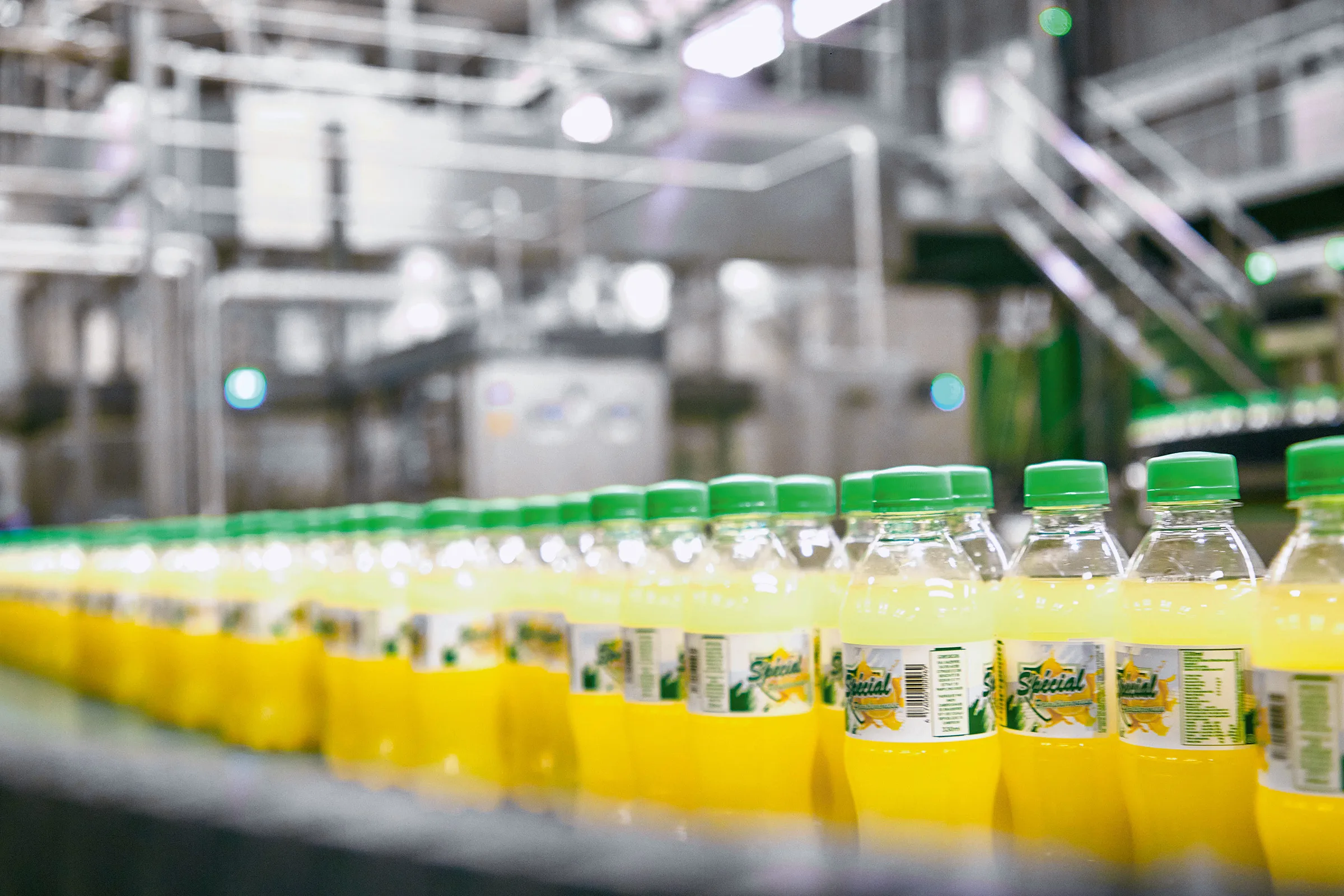
On UCB’s PET line water and soda pop are filled into four different sizes of bottle – here the 330-milliliter variant.
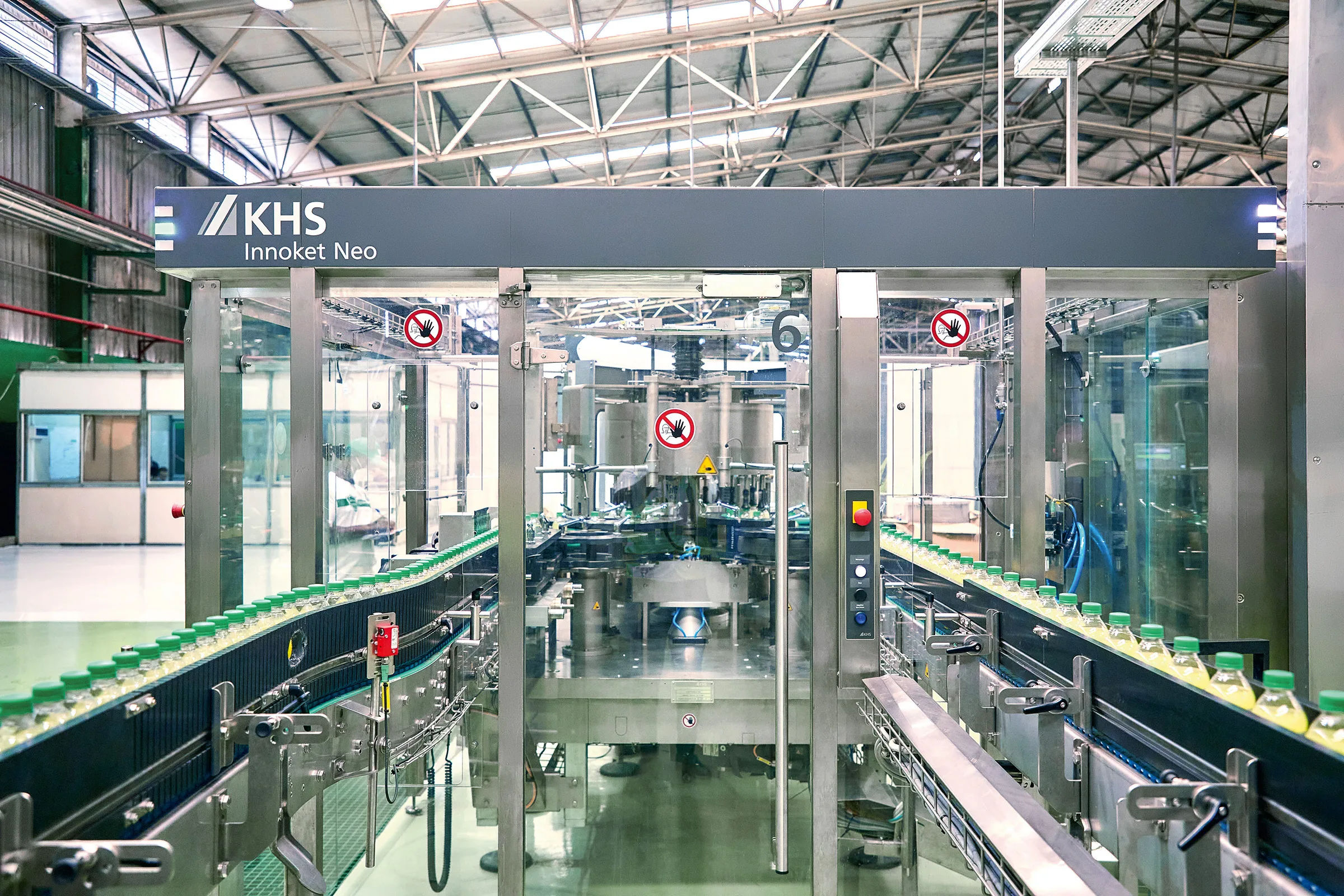
The KHS Innoket Neo roll-fed labeler dresses the PET bottles on the line with labels.
On schedule
The pandemic caused a number of delays among sub-suppliers responsible for preceding work, particularly in 2020, that could be largely compensated for as both the packaging and palletizing sections of the second glass line and the new PET line were more or less fully implemented by the KHS subsidiary in Nigeria. This meant that installation and commissioning were completed within the given time frame.
Many other KHS projects currently in progress in Cameroon illustrate that the country is booming and steadily becoming an attractive market for the Dortmund systems supplier. In the past, the French-speaking countries of Africa especially imported a large percentage of their beverages. However, more and more local retailers and bottlers are now asking themselves why they should ship beverages in from Europe when they could bottle them themselves in their own region.
In the following interview with “KHS competence”, Whalen Kadji, project manager for the Kadji Group and one of the brewery founder’s grandsons, gives us an insight into his company’s philosophy and sustainability strategy and talks about its cooperation with KHS.
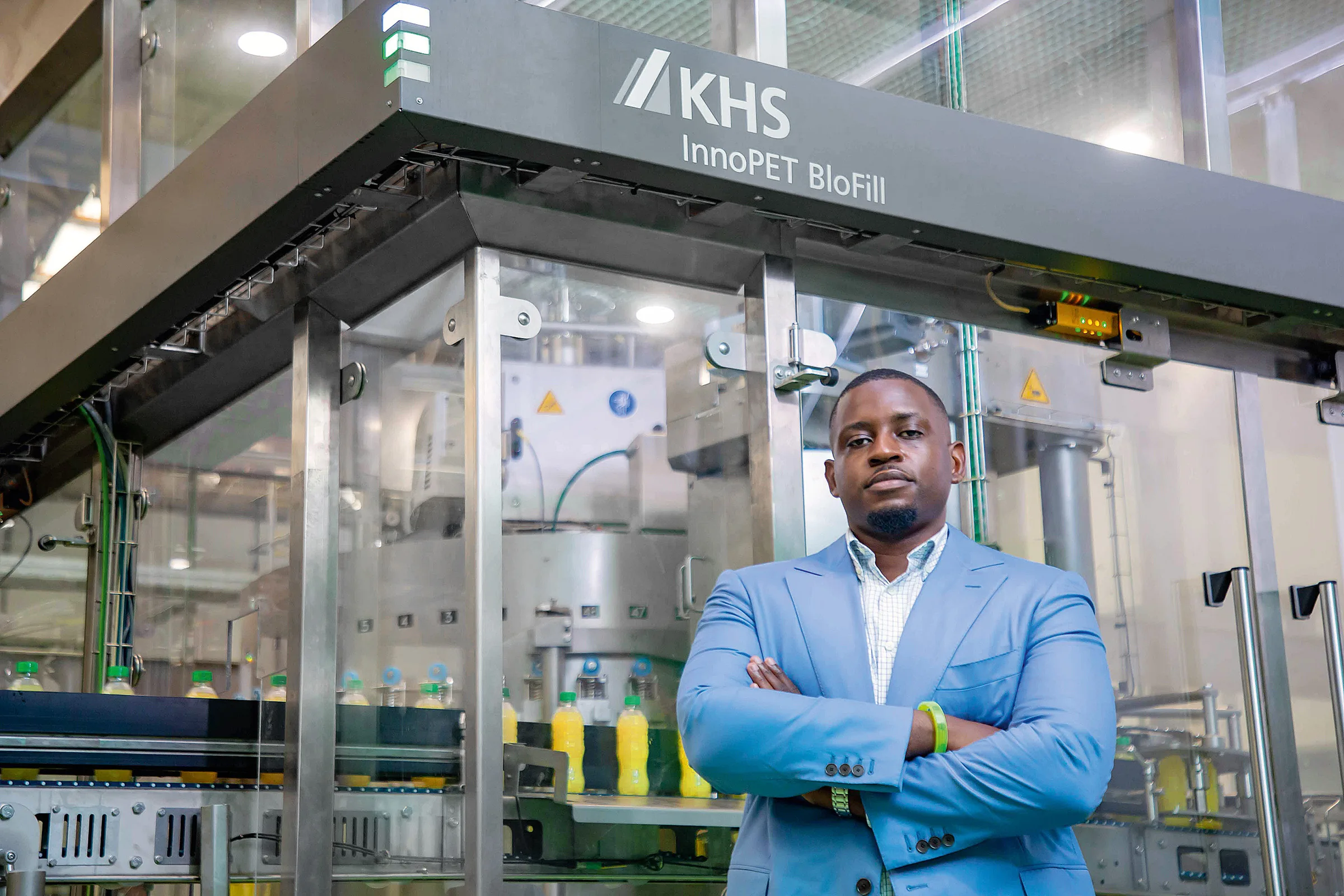
Whalen Kadji is convinced that UCB has made exactly the right choice in opting for KHS.
You can find more information about our KHS Innoket Neo RF labeling machine plus an illustrative video on khs.co
How would you describe UCB’s corporate philosophy?
Our company is characterized both by the deep roots it has in the culture of Cameroon and by our wish to become better and better. Founded in 1972, we’ve always put quality before quantity and have thus been able to retain our expertise and individuality. As proud Cameroonians we still stand for perfect craftsmanship in brewing and believe in only using the best ingredients.
Quality seems to be an important factor for your brewery. How do you establish and maintain your high standards of quality?
Our core values are creativity, integrity and courage. Quality also indeed plays a key role for us – in our processes and in our dealings with our partners, both in Cameroon and abroad. With the help of a dedicated system of quality management, with precise planning and strict methods of measurement we achieve top performance at practically every point in the value chain.
What have been the most significant success factors in the almost 50 years of your company?
For us, people have always been the key to our success. Our founder Joseph Kadji Defosso envisaged a company that would become one of the best in its field. Besides this vision he also had the will and determination to achieve this goal. Now, under the leadership of Nicole Kadji Defosso, his daughter, we’re constantly on the lookout for first-class employees whose professional attitude and qualifications satisfy the highest standards and who are able to tread in Joseph Kadji’s great footsteps.
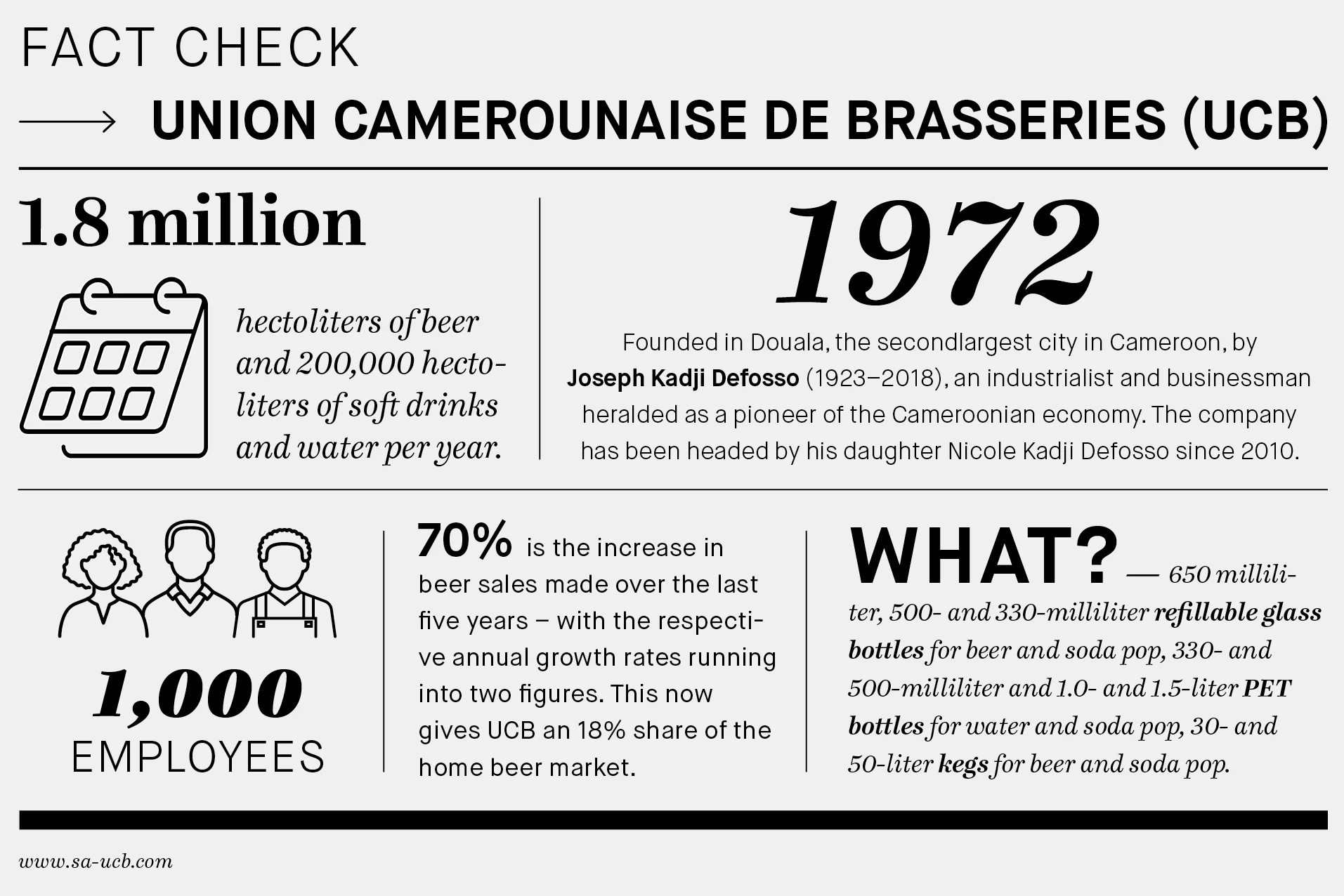
If we now turn to the bottling of your products, which container segments are most important in Cameroon? And what role does sustainability play in this context?
On our home beer market the returnable glass bottle definitely has the lion’s share. Beer can be pasteurized in this type of container, meaning that it keeps longer. What’s more, the glass acts as a CO₂ diffusion barrier, thus ensuring long-lasting quality on the shelf. Moreover, bar proprietors and owners of small stores find it of great benefit that the empties are collected from their properties. Finally, for our part we procure our bottles from a local glass factory that can also recycle glass. This therefore means that this is a tried-and-tested and sustainable material for container manufacture on all counts.
Which trends and developments do you see emerging in relation to beverage packaging in Cameroon?
PET has enjoyed a rise in popularity in conjunction with carbonated soft drinks and water for some time now. Unfortunately, we don’t yet have a bottle-to-bottle recycling system in Cameroon, however. At the moment plastic bottles are merely pressed, shredded and sent to a PET materials manufacturer. In view of their rapidly increasing use and the subsequent growing amount of plastic waste, the PET recycling process still needs to become established here. Cans and kegs made of aluminum could be an alternative to this material but at present this is still a very small segment, albeit one that’s growing. This is based on the premise that these containers are made locally, however. Cameroon needs to catch up here.
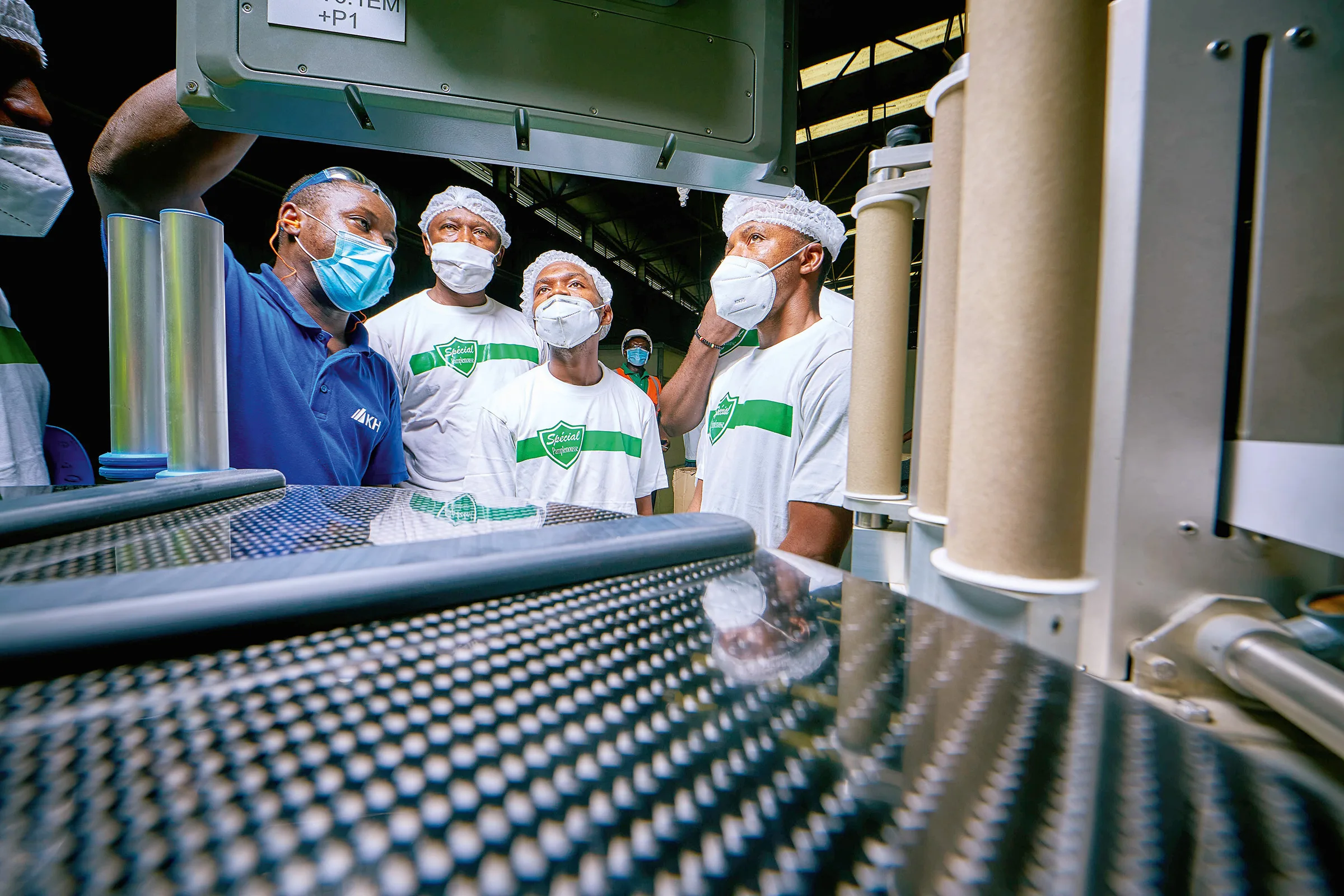
A KHS service employee shows UCB operators how to change reels on the Innoket Neo for roll-fed labeling.
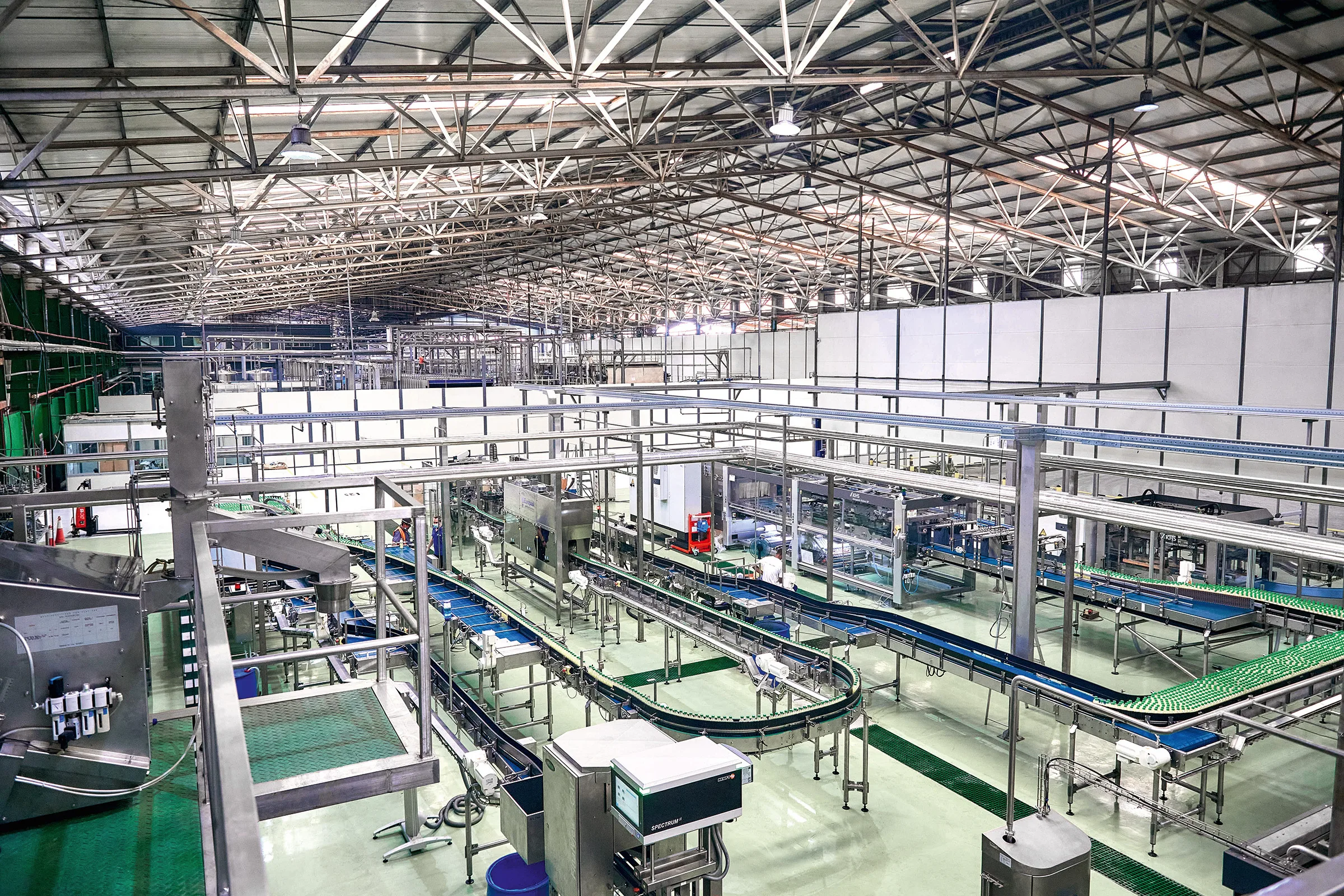
View of the line’s packaging section: in the center is the labeler, with the packer to the right and the conveyors with buffer segments in front of and between the two.
Is plastic waste a big issue in your country? What are the state and the economy doing to prevent it?
Plastic and especially PET waste is indeed a big problem. We do have a few state regulations and levies in place but they have very little impact. One major reason for this is, for example, that empty PET bottles are often reused for a totally different purpose, although there are repeated warnings not to do so. For the Kadji Group, which UCB is part of, the protection of the environment has a high priority. We’ve thus entered into partnership with a number of startups that invest in PET recycling. Among them is a company that makes school bags and pencil cases from recycled PET and another that presses and bundles returned bottles and sends them to recyclers in Europe. We’re also planning on building our own recycling plant in the near future. PET is a great opportunity for the African market. After all, we all want to act sustainably.
Why was it necessary to make the most recent investment in your production technology?
With our former, extremely old lines we could neither meet the growing demand nor adhere to production standards. In order to stay competitive and satisfy our customers, we thus had to invest in new plant engineering. We looked for robust, reliable technology that gives us the right product quality at the right time. In opting for KHS we made a very good choice.
What particular challenges did you face regarding economic and ecological sustainability and what results have you achieved?
If you want to stay competitive and cut costs, you have to optimize your use of resources and learn how to produce more intelligently and more sustainably. KHS showed us just which factors pushed our production costs up in the past; accordingly, machine availability was one of the key criteria that prompted us to award the contract to the company from Dortmund. After installing our new glass line our performance increased by 50%, with our CO2 consumption dropping by almost 40% at the same time. We were even able to halve the amount of product loss.
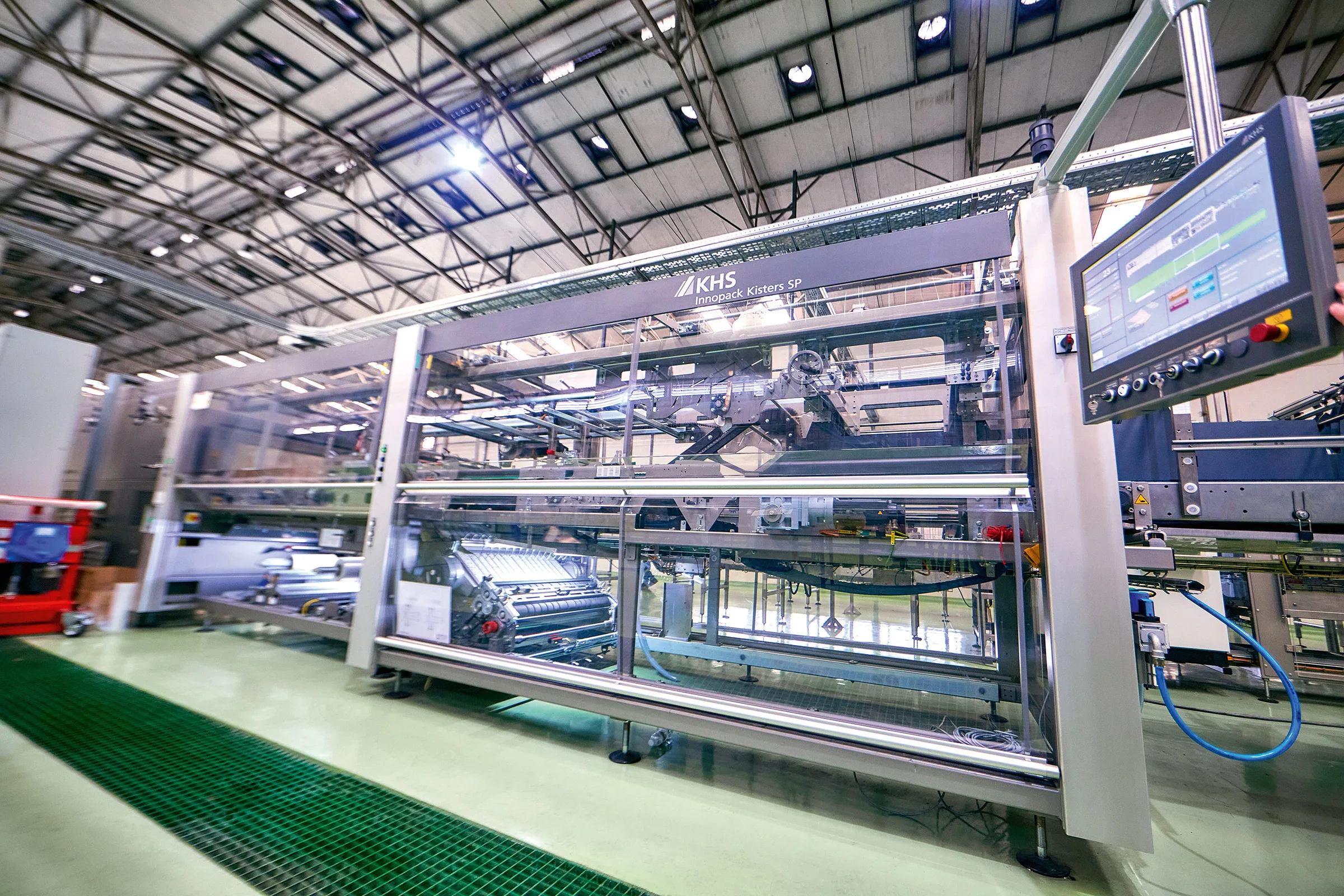
The line at UCB includes an Innopack Kisters SP, a shrink packer that wraps and bundles the packs in shrink film.
How would you describe the relationship between UCB and KHS?
We’ve worked with KHS and its predecessor companies since our founding almost 50 years ago. Although we were only a small business back then, our concerns were always given the greatest attention. Historically speaking, we thus have a very strong relationship. Whereas in the past we usually did business with KHS contacts in France or South Africa, KHS now has a young, dynamic and flexible team in Lagos, Nigeria, with well-trained technicians and engineers. For us, our most recent investments prove that machines are one thing but that having a trusting partnership with access to extensive technical support is at least just as important.
What role does after-sales service play for your company?
A system of technical support with reliable maintenance and service is a crucial aspect for us. KHS already gave us top-quality service many years ago. And today we can also still rely on receiving unlimited assistance at any time of the day or night. The availability of spare parts presents a particular challenge: here, KHS scores on all fronts with its West African service hub in Lagos, Nigeria.
How did the corona crisis affect the installation and commissioning of your new lines?
Managing projects during the pandemic was an enormous challenge. During the first lockdown last year, lots of people were really worried about coming to work or traveling. We were also initially concerned about having engineers come to us from Europe that was much more heavily affected than many parts of Africa. This was further complicated by the fact that PCR tests were hard to come by. There was only one test center in the capital of Yaoundé which is about four hours from us. And even those who managed to get tested still had to quarantine for two weeks. We therefore decided to postpone the entire installation of the glass line until the end of 2020.
What future strategic goals does your company have?
We’ve been in the beverage industry in Cameroon and Central Africa for almost half a century now. We’ll continue to supply high-quality products and act sustainably in the future, too. In maintaining and intensifying relations with our business partners we’ll foster growth and at the same time reduce the negative impact of our line of business on the environment. Dealing with Covid-19 has heightened our awareness of the future opportunities open to us across the entire continent.
